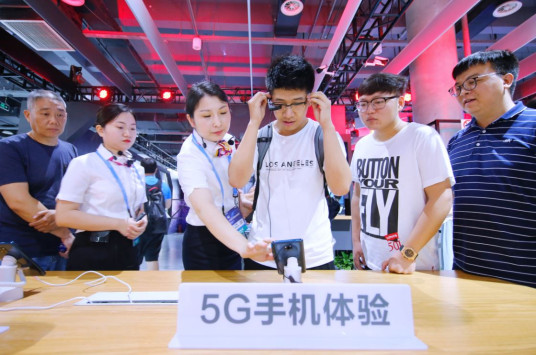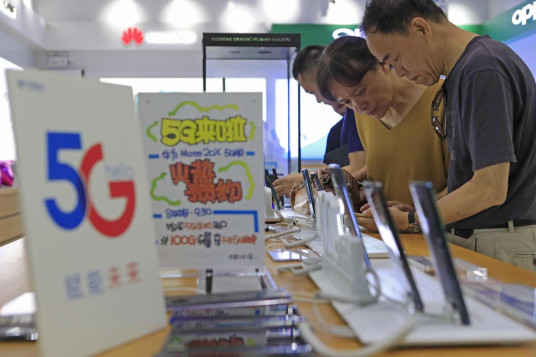Signal is clear, 5G is here
 |
|
Vistors try 5G phones at an international expo on June 20, 2019. [Photo by Liu Chenghe/For China Daily] |
China's telecom carriers dig deep into their pockets to play a pioneering role in game-changing technology
In 2003, when Huawei Technologies Co, then known more as a manufacturer of telecom equipment like switches, and base stations, decided to set up a mobile phones department, China was still using 2G, or the second-generation wireless technology.
Back then, only a fraction of consumers could use cellular phones to surf the internet. And it took them about five seconds or longer to open a web page.
Sixteen years on, Huawei is the world's second-largest smartphone maker. Its 5G-enabled handsets can download heavy data files - say, a 1 GB movie - in seconds. That's just a glimpse of the commercial possibilities in the 5G era, which China kicked off in June.
From a virtual non-entity in the global mobile phones market to a world-renowned company, Huawei's rise has been meteoric, and it coincided with the development of China's telecommunications industry.
Huawei, however, is just one of the many Chinese telecom companies that have thrived on the global stage in recent years, helping the country to transform from a follower during the period of 2G and 3G to a pioneer in the 5G era.
Xiang Ligang, director-general of the Information Consumption Alliance, a telecom industry association, and a keen observer of the telecom sector for nearly two decades, said: "Chinese telecom companies have made big strides in their innovation capabilities, through their consistent and heavy input into research and development. They have strong willingness to pioneer cutting-edge applications."
Four of the world's top six smartphone makers - Huawei, Xiaomi, Oppo and Vivo - are Chinese. In 2018, the country produced 1.8 billion smartphones, accounting for 90 percent of global production, data from the Ministry of Industry and Information Technology showed.
Their decades of efforts have helped nurture the world's largest online population in a single nation - the 854 million strong Chinese netizens (as of June). That is more than the combined population of European countries. More importantly, more than 99 per cent of netizens in China surf the internet through smartphones.
 |
|
Consumers visit the booth of China Telecom as the company's Shanghai branch launches a promotion called "Buy 5G mobile phones and enjoy 5G network." [Photo by Ying Liqing/China News] |
Wu Jichuan, 82, a former head of the former Ministry of Posts and Telecommunications, said handsets are becoming almost omnipresent in the country. They can help users do almost everything from buying movie tickets, booking hospital or clinic appointments to ordering meals.
"That was in sharp contrast to 1980s when mobile communication services were first brought to China. Back then, only successful Chinese businesspeople were able to use brick-sized, palm-filling mobile phones," Wu recalled.
Such phones, however, were capable of just two functions: making and receiving calls. Yet, they were luxury products of the time. A handset could cost as much as about 20,000 yuan ($2,798). Consumers had to pay an extra fee of 6,000 yuan to sign up for the telecom network services. Calls cost 5 jiao a minute. In comparison, the average salary of ordinary people was no more than 100 yuan a month, Wu said.
According to him, one of the biggest contributions of China's telecom industry is that it laid down a sound digital infrastructure for companies and consumers to access fast internet networks at affordable prices. They laid the foundation for China's kaleidoscope of mobile applications and thriving digital economy.
Leveraging these achievements, the country's telecom carriers are scrambling to establish a beachhead in the 5G era, in which almost everything can be connected to the internet.
As at the end of May, Chinese companies accounted for more than 30 percent of all patents essential to the global standards for 5G. After the country granted the commercial 5G licenses in June, local telecom carriers are working to build a sound network infrastructure to accelerate the technology's commercialization.
Yang Jie, chairman of China Mobile, the world's largest mobile operator, said the company plans to cover 50 cities across China with 5G signals by the end of this year.
"That will involve deploying 50,000 5G base stations across the country," Yang said, adding that the company has already raised 7 billion yuan as the first phase of a 5G fund to promote the development of key technologies. The planned total size of the fund is 30 billion yuan.
Similarly, China Unicom said it will cover at least 40 cities with 5G signals by the end of this year and work together with all industry partners, including foreign companies, to accelerate 5G infrastructure construction.
 |
|
The booth of a 5G company at the MWC2019 in Shanghai on June 28. [Photo by Lyu Liang/For China Daily] |
Just a day after securing its 5G license, China Unicom announced it had opened experience stores across 40 cities to encourage consumers to try applications powered by the superfast technology.
Visitors can play with mechanical robotic arms, watch 4K high-definition live-streaming, wear virtual reality goggles to play 3-D games and learn that with 5G, doctors can complete surgeries on patients 2,500 kilometers away.
Lyu Tingjie, a telecom professor at the Beijing University of Posts and Telecommunications, said: "After all the hype about 5G, the new era has finally started. All the state-of-the-art applications are getting closer to the public than ever. The next question is: How to better time the rollout and partner with a wide range of traditional sectors to boost efficiency?"
The country's telecom carriers are expected to spend 900 billion yuan to 1.5 trillion yuan on 5G network construction from 2020 to 2025, according to a report from the China Academy of Information and Communications Technology.
The first batch of 5G smartphones hit the market in August. China Unicom said its 5G data packages will cost a minimum of 190 yuan, arguably the world's lowest price, in its first stage of application.
In comparison, the minimum cost in South Korea's 5G data packages is about 325 yuan per month, while US telecom operator AT&T charges users $70 (equivalent to 498 yuan) for 15-gigabytes of 5G data every 30 days.
Meanwhile, Chinese telecom equipment makers are securing a growing number of 5G contracts to supply foreign telecom carriers. Huawei said it had signed 50 commercial contracts for 5G with carriers worldwide, with 28 contracts from Europe, 11 from the Middle East, six from the Asia-Pacific region, four from the Americas, and one from Africa.
William Xu, a director on Huawei's board and president of the Institute of Strategic Research, said the company has had more than 200,000 5G base stations in shipment, which marked a steady step forward, compared with its earlier announcement of 150,000 base stations in late June.
Huawei has invested about $4 billion in all so far in the research and development of 5G since 2009.Founder and CEO Ren Zhengfei has said in an interview that other players will not be able to catch up with Huawei in 5G over the next two to three years.
According to a forecast by the Global System for Mobile Communications Association, an industry group, China is set to become the world's largest 5G market by 2025, with 460 million 5G users.

